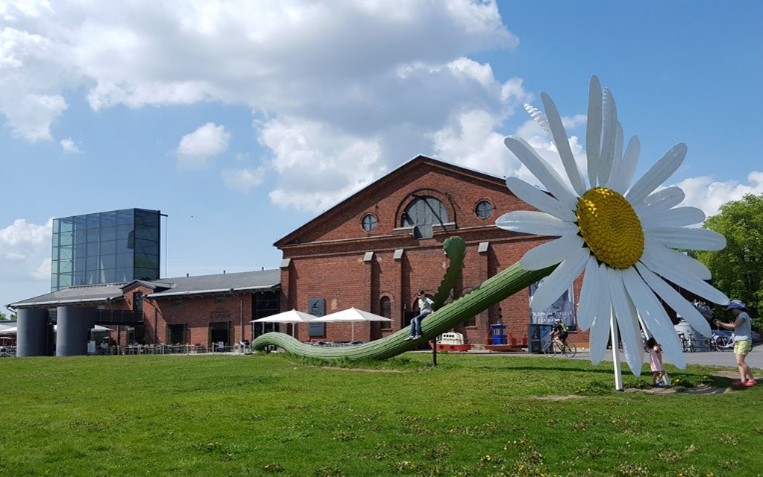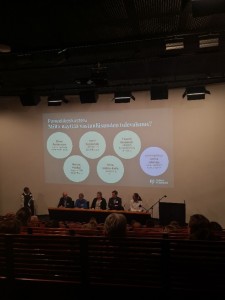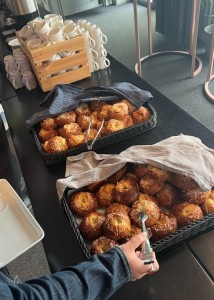Charting New Waters – Responsibility in the Maritime Industry’s Supplier Network -seminar

Forum Marinum was buzzing with people interested in maritime industry sustainability on Monday, June 9, 2025. The seminar Responsibility in the Maritime Industry’s Supplier Network (Vastuullisuus meriteollisuuden toimittajaverkostossa) was organized as part of the Merimerkit- and SusFlow-projects. The main goal of the Merimerkit-project, co-funded by the European Union, is to strengthen the competitiveness, vitality, and resilience of the maritime cluster by developing new solutions that promote sustainability-driven innovation within the network. The SusFlow-project, funded by Business Finland, focuses on collecting and utilizing sustainability data in business networks, such as Life Cycle Assessment (LCA) calculations and evaluations.
Research assistants had the opportunity to network and deepen their expertise at the joint Merimerkit & SusFlow seminar alongside researchers Juuliska Seikola and Heli Aramo-Immonen from the S4M project. Throughout the day, assistants’ camera rolls filled with presentation slides, their fingers flew across keyboards taking notes, and they helped set up S4M roll-ups.
The morning began with networking coffee, after which everyone headed to the auditorium where the first session of the seminar was about to begin. Merimerkit and SusFlow kicked off the morning program with brief introductions. Speakers included representatives from the University of Turku and companies such as Rauma Marine Constructions, Europlan Engineering, Woodio, and Pedro. After the morning session, participants enjoyed a delicious lunch at Restaurant Göran. The afternoon program was led by SusFlow and featured speakers from Meyer Turku, NIT Naval Interior Team, VTT, and Evac, in addition to researchers from the University of Turku. The S4M project collaborates with both SusFlow and VTT.
Here are a few highlights from the presentations. VTT’s senior researcher Sami Majaniemi introduced the Network-LCA tool, which enables the collection, analysis, and sharing of LCA data within a network. As companies transition to circular economy solutions, collaboration among value chain actors becomes especially important. The tool allows for comparison of how changes in company-specific data collectively affect network-level sustainability metrics, such as total carbon footprint. These metrics can also be calculated locally at the company level, making the tool useful for product design.
Juha Lehtonen from Pedro Ltd emphasized how important ensuring responsibility matters are in order for a company to stay at the forefront and grow. One memorable takeaway from Pedro Ltd’s presentation was how the city of Lahti, through its environmental actions, has supported them as a company—particularly in terms of waste sorting. This was an interesting and important example of how cities, through their own actions and concrete measures, can accelerate and support companies in the green transition. Lehtonen also noted that modern times lack sufficient emphasis on craftsmanship. It’s important to remind people of the value and significance of manual skills. The decline in craftsmanship has broader impacts than many realize, and its absence negatively affects working life.
Eini Haaja and Jouni Saarni from the Turku School of Economics explored the question: What is expected from the development of sustainability in the shipbuilding business environment? Sustainability and greenness alone do not guarantee the Finnish maritime cluster’s distinction in the market; instead, the importance of networking and sales is emphasized. Organizational competence should be developed so that sustainability is embedded in processes from measurement all the way to sales. This way, markets can be steered toward greater responsibility.
The presentations were followed by a panel discussion titled – What does the future of sustainability look like? Panelists included Elina Andersson, CEO of the Finnish Marine Industries Association; Hanna Haaksi, Head of ESG at Meyer Turku; Tiina Vainio-Kaila, senior researcher at VTT; Harri Leppänen, Head of EHS at SSAB Europe; Tapani Wendelin, VP of HSEQ & Sustainability at ALMACO; and Dr. Leena Jokinen, futures researcher at the University of Turku, who also chaired the discussion.

Photo: Adesuwa Okunhon
This was the first panel discussion related to the maritime industry that the research assistants had the opportunity to attend. It was incredibly interesting to listen to representatives from various organizations discuss and share their views on what sustainability in the maritime sector will look like and how it already appears in the industry. Here are the most memorable highlights from the panel discussion.
Human rights issues and the fight against corruption as part of the sustainability dialogue were raised right at the beginning of the panel. This was a refreshing observation, as these topics often remain overshadowed by other sustainability themes. Another particularly striking point was how product design can ensure efficient use of materials throughout the entire lifecycle. Good product design also helps ensure cost-effective use of resources from a business perspective. The panel sparked valuable discussion when participants were asked what concrete collaboration in the maritime industry should look like. All panelists agreed that functional processes must be jointly considered at the conceptual level and unified guidelines should be created for the entire network. RDI-projects and encouraging open dialogue were also seen as important tools for strengthening collaboration. Toward the end of the panel, it was noted that Finnish companies still have room for improvement in marketing, and that other sales angles should be considered in addition to responsibility.
After the seminar, the aroma of coffee and freshly baked buns filled the air. During the afternoon coffee break, there was an opportunity to explore various demos that had been presented earlier in the day, such as VTT’s Network-LCA calculation software Sulca.
Overall, the day was highly rewarding and inspiring, and it’s wonderful that being part of this project enables participation in such events.

Photo: Miina Mäki
Authors:
Miina Mäki, student assistant, Turku University of Applied Sciences
Adesuwa Okunhon, student assistant, Turku University of Applied Sciences
Circular Business Models Research Group
